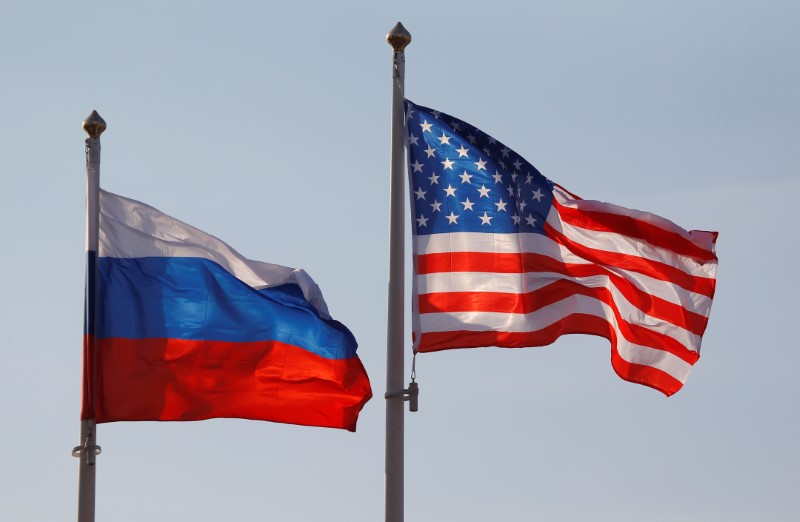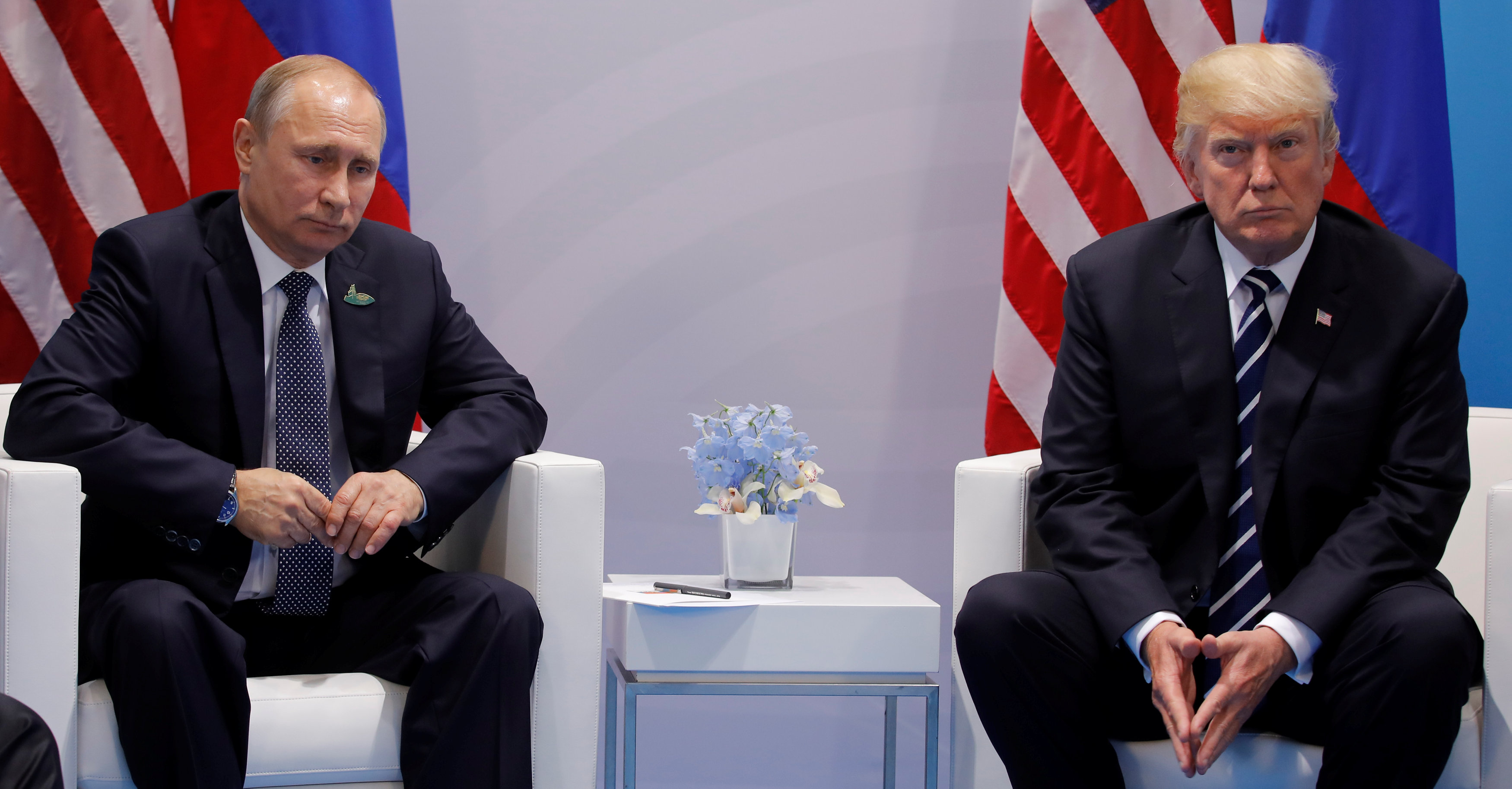Under Trump, US-Russian relations hit new low

President Donald Trump came into office with hopes of establishing a “fantastic relationship” with Russia, praising his counterpart in Moscow as “very smart.” Instead, after almost six months in office, his administration is mired in a growing investigation into its possible collusion with the Kremlin during the 2016 presidential election, and, ironically, U.S.-Russia relations are at an all-time low.
Now, as Trump has his first in-person meeting with President Vladimir Putin at the G-20 summit in Germany, U.S. officials are keeping their distance. “There are people frozen in fear they’re going to be tarred by the ‘Red Scare,'” said Rolf Mowatt-Larssen, the former head of intelligence and counterintelligence at the U.S. Department of Energy.
Mowatt-Larssen, now the director of the intelligence and defense project at the Harvard Kennedy School’s Belfer Center, spent more than two decades working for the CIA, including in the Soviet Union during the Cold War. He argues that reporters, lawmakers, military personnel, and intelligence professionals are afraid of inadvertently appearing too “pro-Russia” simply by mentioning small areas of possible coordination. “We’re making excuses for ourselves,” he said during a phone interview.
For Russia hawks and isolationists alike, Trump’s interactions with Russia have been disappointing. “One of the casualties is the opportunity to develop constructive relationships with Russia in areas where we need a constructive relationship, like nuclear matters,” former Defense Secretary William Perry told journalists at a recent dinner in Washington, D.C., sponsored by the Hoover Institution. “Nobody dares talk with Russia today even with good reasons.”

Added to those troubles is the Trump administration has, since the early days of the transition, made almost no effort to engage with the Russia experts on the National Security Council (NSC) – or “at least take them seriously,” according to one source informed on the internal meetings. Efforts to coordinate informal policy conversations with different government agencies on very basic positions toward Russia fell on deaf ears, never reaching the level of even a principals committee meeting, the source said.
Trump political advisors on at least two occasions tried to push for rolling back sanctions on the Kremlin in an effort to “work with Russia,” blind to the policy implications and the public relations nightmare it would cause – though those proposals never made it past informal discussions, according to the source and reporting by the Daily Beast.
Now, that source says, the only people trying to make decisions on Russia are at the top levels of the State and Defense departments – ignoring both their staffs and the entire NSC along the way.
The NSC staff aren’t the only ones without a compass. One former CIA official told Foreign Policy that colleagues still working in the agency are floundering, unsure of what policy is in place when it comes to Russia. “Nobody really knows what foreign policy they’re supposed to be following . . . because there isn’t one,” the former official said.
The Trump administration has recently started speaking with Russian policy experts outside of the White House, including at the Center for a New American Security, though it’s unclear what influence that will have. “While we can’t go into the specifics of private conversations, our experts have had discussions on Russia issues with the NSC, Department of Defense, and Department of the Treasury,” a CNAS spokesman wrote.
The tension between Russia and the United States certainly didn’t start under Trump. Under former President Barack Obama, the two countries in 2009 agreed on a “reset” in relations but found little common ground. Instead, Syria and President Bashar al-Assad became major points of contention. Then, in 2014, Russia invaded and annexed the Crimean Peninsula in Ukraine, followed in 2016 by a massive campaign to meddle in the U.S. presidential election. Obama continued to reach for economic sanctions in response – a decision many Republicans described as inadequate.
While President Obama’s responses to Putin’s misbehavior attracted criticism, there was at least an interagency process in place, led by the NSC. “In 2014 the administration realized that our relationship with Russia was fundamentally adversarial,” Jeffrey Edmonds, the former acting senior director for Russia during the transition at the NSC, wrote in an email to FP.
The obvious consequences of failing to talk to Russia on issues like nuclear weapons, Syria, and counterterrorism is provoking an unintentional war. “The situation isn’t good.. . . We should be working things out,” Mowatt-Larssen said.
Some areas of U.S.-Russia cooperation continue, however. On June 20, the Russian Cultural Center – part of the Russian Embassy in D.C. – hosted an event honoring research being jointly done by Moscow and Washington on U.S. and Russian military personnel who went missing during World War II. At least one person from the Pentagon was in attendance.
The Arctic and space exploration also still offer common ground. “Despite all the kind of overdrawn and very nervous press articles that appear about resource wars and shipping wars and militarization of the Arctic – in fact, the Arctic is a pretty peaceful place today,” Kenneth Yalowitz, a former U.S. ambassador to Belarus and Georgia who is now with the Wilson Center’s Polar Initiative, told FP.
The United States has also “continued without any complications in our cooperation with Russians on the international space station,” Todd Harrison of the Center for Strategic and International Studies told FP. The Russians rely on the United States for operations and control, while the Americans rely on Russia for passage to and from the space station.
Mowatt-Larssen told FP that the relationship between intelligence agencies might be fertile ground for rebuilding some sort of connection, however tenuous. While he couldn’t go into detail, he said there is now preliminary work underway to try to improve relations between the two nations’ intelligence agencies, at least on a limited basis.
It’s not the first time. Last July, the United States and Russia announced a tentative plan for a joint command center for military and intelligence professionals to cooperate on Syria. It’s a “traditionally very productive area,” Mowatt-Larssen said. “It sounds difficult because of the tension, but they are practical parties, action-oriented.”
Even those small areas of cooperation, however, could be threatened if the United States levies stricter sanctions, a position that has received broad support from Congress.
Edmonds, now at CNA, a nonprofit research organization, said the NSC team spent a year working on an interagency process to determine how to respond to Russia, given its aggressive behavior. “We questioned assumptions, derived Russia-related end states from the National Security Strategy, and developed a strategic framework through which principals could work out a national strategy on Russia,” he said.
But now the investigation into the Trump team’s connections to Moscow has overshadowed the policy issues, making any new strategy, or even normal contact with Russian government officials, suspect.
“There are things that are in our common interest,” Mowatt-Larssen told FP in an interview. There are opportunities for cooperation in areas “like nuclear terrorism, terrorism in general, international disorder caused by climate change, regional conflicts that grow because of water scarcity, infectious disease,” he said.
Yet cooperation on those high-level issues is precisely what’s lacking, and Perry, the former defense secretary, warned that the United States is slipping into conditions “worse than the Cold War.”
“I had thought up until a few months ago there may be a silver lining in what I considered the dark cloud of the Trump presidency: that we might actually have the opportunity to start talking constructively with Russia again,” he said. “That’s gone. For I don’t know how long, but a long time I think.”
McLaughlin is an intelligence reporter for Foreign Policy. Tamkin is a staff writer at Foreign Policy.